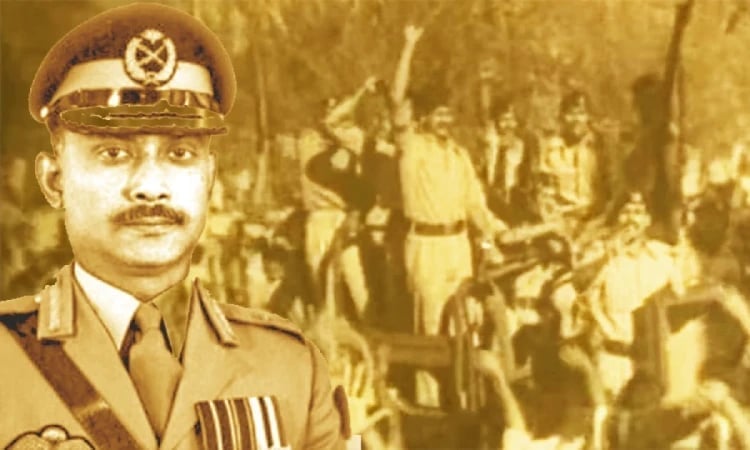News Flash
News Flash

DHAKA, Nov 7, 2025 (BSS) - The "National Revolution and Solidarity Day," marking the civil-military uprising of November 7, 1975, was observed across the country in a befitting manner to celebrate the remarkable moment for the subsequent emergence of Shaheed President Ziaur Rahman as a statesman.
The Bangladesh Nationalist Party (BNP) today observed the day through elaborate programmes, including discussions and other events.
To commemorate the day, the party flag was hoisted at all BNP offices across the country this morning. Senior leaders laid wreaths and offer "fateha" at the grave of late president and party founder Ziaur Rahman at 10:00 am.
Later in the afternoon, BNP's Dhaka north and South City units brought out a procession from the party's Nayapaltan central office at 3:00pm, while all district and upazila units carried out similar programmes nationwide.
In addition, BNP's associate bodies and local units organised a variety of events, including discussions, cultural programmes, photo exhibitions, documentary screenings, and the distribution of educational materials among orphan students.
The party will hold a central discussion on November 12 at the Bangladesh-China Friendship Conference Centre in the capital.
In a Facebook post yesterday (Thursday), BNP acting chairman Tarique Rahman said the soldier-people revolution of November 7 was not only a major turning point in Bangladesh's history but also the beginning of nationalist politics opposing imperialism.
He said the revolution played a crucial role in protecting the nation's sovereignty.
"On that day, driven by patriotism, soldiers and citizens took to the streets vowing to protect national independence and restore democracy. For this reason, the revolution of November 7 is regarded as a highly significant event in Bangladesh's history," he wrote.
Tarique added, "I believe that in the spirit of November 7, all nationalist forces must unite to build a strong democracy. For that, protecting national independence and sovereignty is very important at this moment."
After paying rich tribute at the tomb of BNP founder Shaheed President Ziaur Rahman, marking the Revolution and Solidarity Day, BNP Secretary General Mirza Fakhrul Islam Alamgir today said that the rise to power of BNP founder Shaheed President Ziaur Rahman through the Sepoy-People's Revolution was a turning point for the country.
"On the historic November 7, 1975, the people thwarted the conspiracy of hegemonism. The rise of the statesman, Shaheed President Ziaur Rahman, to power through the Sepoy-People's Revolution was a turning point for the country," he said.
The BNP secretary general also said that various malicious attempts and conspiracies are now underway to destroy democracy after the July Uprising. He called upon everyone to unite and thwart these conspiracies in the spirit of the historic November 7.
On this day 50 years ago, Bangladesh began a new journey through a joint revolution of the members of the armed forces and mass people emerging from a state of chaos and uncertainty.
On November 7, 1975, the streets of the capital Dhaka and elsewhere in the country drew thousands of people to celebrate the remarkable moment for the subsequent emergence of Shaheed President Ziaur Rahman as a statesman.
The nation once again heard him on radio saying "I am Zia speaking", the call sign like the voice it had heard by the people at the onset of the 1971 Liberation War. His presence revived in people's minds the memories that inspired them to fight for the country's independence in 1971.The people breathed a sigh of relief - as if a heavy stone had been lifted from their chests.
Spontaneous processions of revolution and victory filled the streets. The air rang with applause, chants, and slogans as soldiers and civilians embraced one another, shoulder to shoulder, hand in hand.
"Soldiers and people are brothers; long live Bangladesh; long live Major General Ziaur Rahman; join hands - soldiers and people, unite!" were the slogans they chanted in chorus reflecting the hearts of soldiers and the people.
The historic November 7 thus became a turning point in Bangladesh's history, being observed as the National Revolution and Solidarity Day.
Through this revolution, Bangladesh began a new journey, slowly emerging from a state of chaos and uncertainty. On this day in 1975, the then Chief of Army Staff Major General Ziaur Rahman broke the country free from the web of geopolitical, expansionist, and neo-colonial conspiracies.
In a critical moment of national crisis, patriotic revolutionary soldiers and civilians overthrew the conspirators through a mass uprising and placed General Zia in leadership.
After November 7, 1975, the evolution of self-dignified, distinctive Bangladeshi culture and identity began. A new dawn of hope heralded and the new hero of that dawn was the son of history- Ziaur Rahman.
Over the years, there have been many conspiracies to erase his memory, but breaking through those plots, Zia secured a permanent place in the people's hearts.